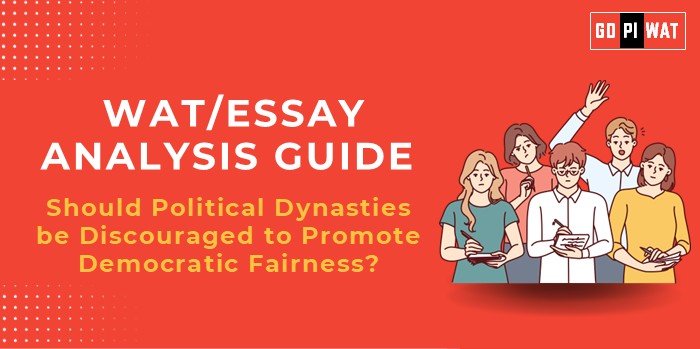📋 Written Ability Test (WAT)/Essay Analysis Guide: Should Political Dynasties Be Discouraged to Promote Democratic Fairness?
🌐 Understanding the Topic’s Importance
This topic addresses the tension between democracy and inherited power. It examines how political dynasties influence governance, representation, and equality in electoral systems, linking directly to governance and ethics.
📝 Effective Planning and Writing
- ⏳ Time Allocation:
- 📌 Planning: 5 minutes
- ✍️ Writing: 20 minutes
- 🔍 Review: 5 minutes
- 💡 Preparation Tips:
- 📊 Gather data on dynastic dominance and its democratic implications.
- 🔎 Note examples from both successful and problematic dynastic regimes.
💡 Introduction Techniques for Essays
- ⚖️ Contrast-Based: “While democracy thrives on fair competition, political dynasties concentrate power, raising questions about meritocracy versus legacy.”
- 📜 Historical Context: “From the Nehru-Gandhi family in India to the Bush dynasty in the US, political dynasties continue to shape democracies worldwide.”
🛠️ Structuring the Essay Body
- 🏆 Achievements:
- ✅ Stability and Continuity: The Lee family’s role in Singapore exemplifies dynasties that deliver growth.
- 🤝 Voter Trust: Dynasties capitalize on established reputations, often ensuring voter loyalty.
- 📜 Legacy in Policy: Long-term initiatives benefit from experienced leadership within families.
- ⚠️ Challenges with Comparative Analysis:
- ❌ Governance Issues: Corruption and entitlement linked to dynasties in the Philippines.
- ⚖️ Inclusivity Deficit: Non-dynastic leaders like Angela Merkel showcase the advantages of a meritocratic rise.
- 🚀 Future Outlook:
- 🤝 Promote equitable representation through internal party reforms.
- 🔒 Implement regulatory measures to cap dynastic dominance without undermining voter choice.
📄 Concluding Effectively
- ⚖️ Balanced Perspective: “While political dynasties offer continuity and voter familiarity, they must coexist with systems ensuring democratic fairness and meritocracy.”
- 🌟 Future-Focused Perspective: “Building robust electoral and governance mechanisms can address the risks of dynastic dominance while retaining its potential benefits.”
🔎 Analyzing Successes and Shortcomings
- 💪 Key Achievements: Stability, continuity, and legacy-driven governance.
- ⚠️ Ongoing Challenges: Lack of inclusivity, meritocracy erosion, and unequal representation.
- 🌍 Global Context: Singapore’s meritocracy vs. the Philippines’ inequality under dynasties.
💡 Recommendations for Sustainable Progress
- ✅ Introduce internal party reforms to promote merit-based leadership.
- 🎓 Foster youth and marginalized community participation in politics.
- 🗳️ Strengthen voter education to encourage issue-based rather than personality-driven elections.
✍️ Sample Short Essays
- ⚖️ Balanced Perspective: “While political dynasties have long shaped democracies, promoting merit-based representation ensures inclusivity and fairness.”
- 🌟 Solution-Oriented: “Curbing dynastic dominance through party reforms and regulatory measures enhances democratic fairness.”
- 🌍 Global Comparison: “Singapore’s mix of dynastic leadership and meritocracy offers a model for balancing continuity with fairness.”


